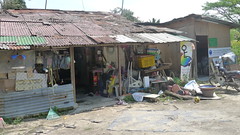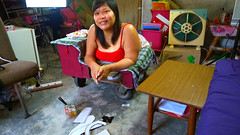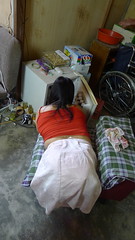Jenny was born on January 3, 1966. Along with her 6 brothers and sisters, she was raised in a small village down a long dirt road in Ipoh, Malaysia. Ipoh is known for its limestone hills and beautiful women. Jenny is one of these women.
Living a country lifestyle, Jenny’s family grew their own vegetables and tended their own chickens. Their house was built by family and had dirt floors and no electricity or running water until about 10 years ago. The house requires constant repairs to fix the roof and walls; the day I visited Jenny a severe rainstorm had blown a large part of the roof off of her bedroom and needed to be repaired.
*Click on photos to enlarge.
Jenny learned responsibility early in life and by the age of 7 she was helping her mother grow and sell vegetables to support her 7 siblings. Like her mother, she stopped going to school when she was 12 years old to assume additional responsibilities for the family. She washed dishes at a local restaurant and worked in a karaoke bar as a teenager to earn income for her siblings.
When Jenny was 18 years old, she married her sweetheart. Less than a year later, she was pregnant and excited to be a mother. She went to the general hospital in Ipoh give birth, but the baby was stillborn and she required an operation to have it removed. Heartbroken, Jenny returned home to recuperate physically and emotionally.
A few days later, Jenny was feeling exceptionally weak from a post-natal viral infection. She got up in the night to urinate but collapsed. When her mother found her in the morning, Jenny told her that she needed to use the bathroom but couldn’t get up. Her mother told Jenny that she had already urinated on the floor. Jenny had no idea because she had lost sensation in most of her body.
Her parents brought her to the ICU at the hospital where Jenny fell into a coma. As the days went by, Jenny’s mother stayed by her side and was confident that she would regain consciousness. After 2 long months, Jenny awoke but she still did not have feeling in her arms or legs. She remained immobile in the hospital for 2 years.
During this time, Jenny waited for her husband to visit her, but he never came to the hospital. He moved out of the house and Jenny has not seen him since. While it pains her to think about the happy times they shared and whether he has a new family, she has no intentions of looking for him.
Jenny’s mother continued to provide emotional and physical support to her daughter. She encouraged Jenny to try to squeeze a rubber ball and after a few days she was able to make slight movements with her arms and hands. While Jenny strengthened her arms by pulling buckets of water up from the local well, her legs never regained feeling. To move around her house, she used her arms to pull herself on the ground. People in Jenny’s village called her “the mermaid” because of the way her legs dragged behind her.
With her doctor’s diagnosis that her legs would never function again, Jenny had them amputated. After the surgery, Jenny discovered that the incision was uneven and prevented her from sitting upright. She continued to drag herself on her stomach along the dirt floors in her house to do her daily chores until her 11-year-old brother advised that she use a trolley to prevent her clothing from becoming soiled and her stomach from being injured.
With her brother’s help, a trolley was constructed for her to get around more easily in the house. Jenny lies on her stomach and pulls herself along with her hands. Learning to get used to her new vantage point of the world, which is about two feet off the ground, has been a difficult and emotional journey. With time, Jenny has been able to see her circumstances and the world in a positive light.
She shared more about her road to recovery and daily life with me when I visited her in March. To read more, click here.
Jenny will be featured in an upcoming documentary by eHomemakers on inspiring women in Malaysia called Portraits of Perseverance.
Posted By Maria Skouras
Posted Jul 6th, 2011




